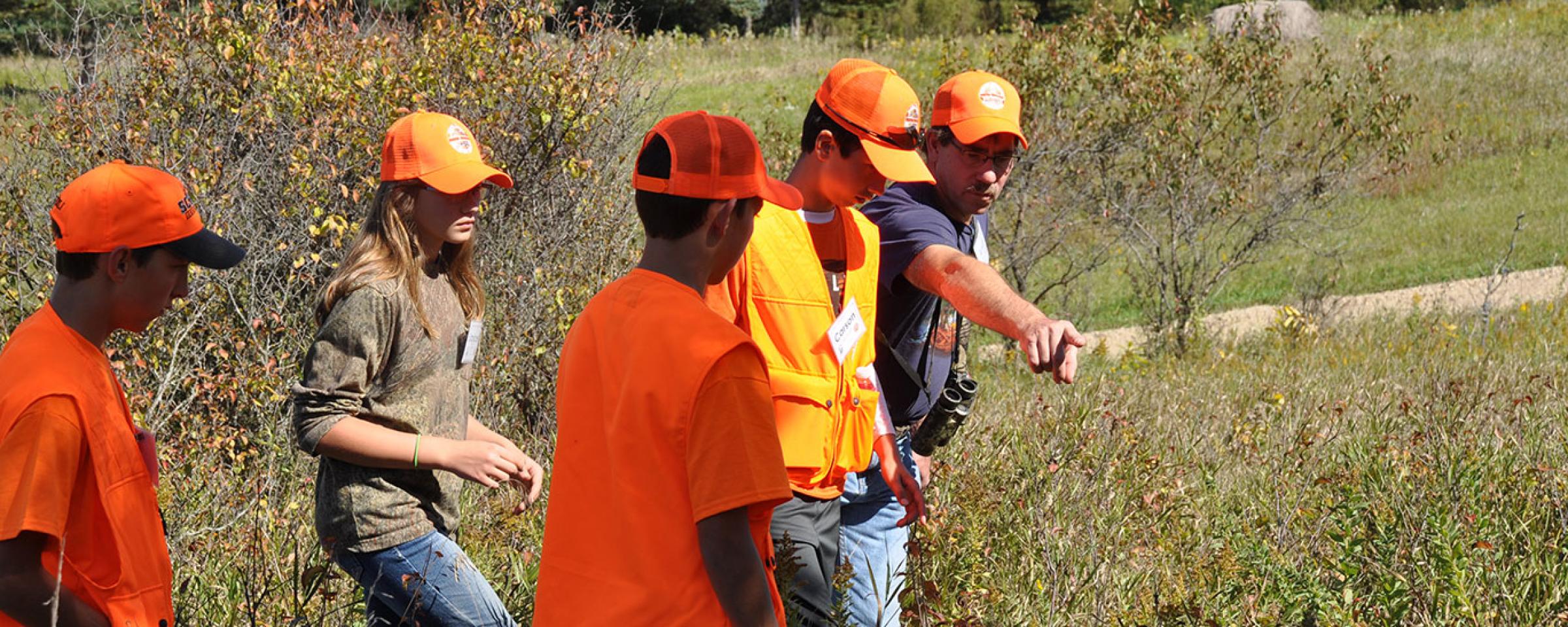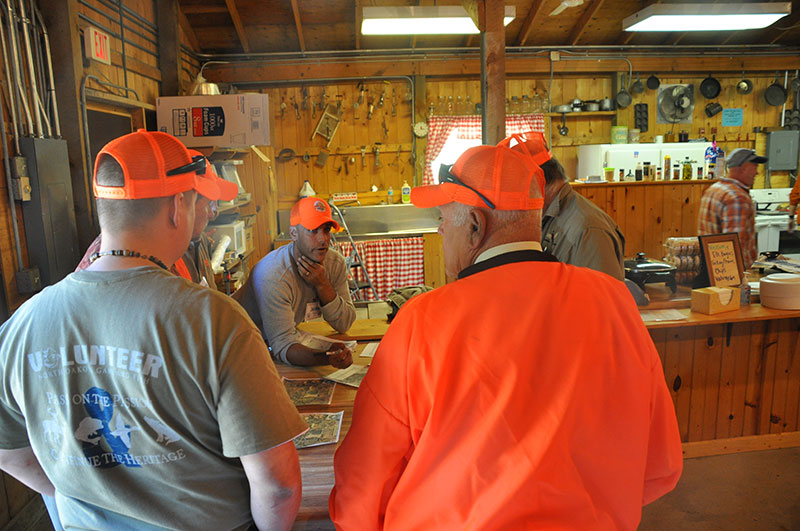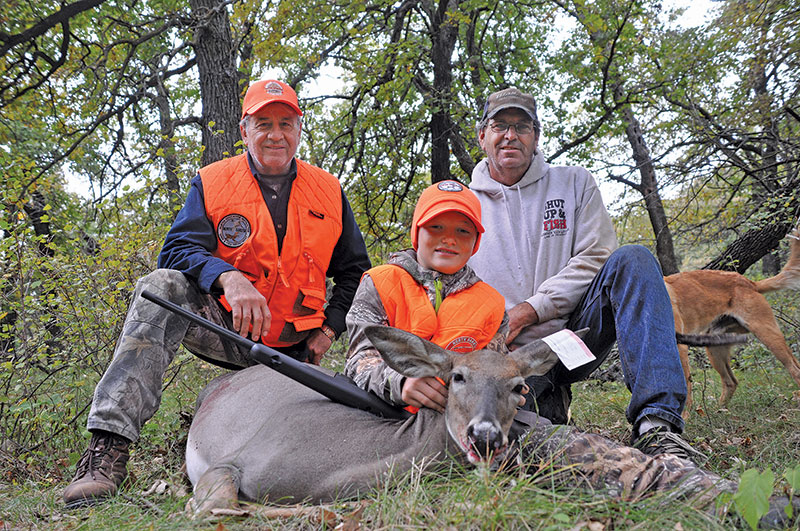
A New Direction for Recruiting Young Hunters
Hunter numbers are declining nationwide, and this is alarming to all who know what this means. Hunters are staunch advocates for wildlife, in addition to being major players in supporting habitat, wildlife management and conservation through purchases of licenses and equipment associated with hunting.
Considering the importance of their voice, and revenue hunters have generated for wildlife and conservation, it’s necessary to promote hunting opportunities to future generations.
That was the purpose of a youth whitetail doe hunt organized earlier this fall by John Mazur, hunter education coordinator for the North Dakota Game and Fish Department.
While these types of hunts are taking place across the nation, this one was a bit different in that it was designed to provide an opportunity specifically for young people who otherwise might not get this sort of chance.
Hunting has become more difficult over the years, especially for those who may not be part of a hunting family. This event was designed to address that situation in one small area, but the larger goal was to develop relationships with other agencies and communities, and provide a model for hunter education instructors, parents and mentors who could replicate this event in their communities.
A big step in pulling together this type of hunt is identifying local youth who might have an interest, but didn’t otherwise have an opportunity to hunt. Joe O’Meara, longtime hunter education volunteer and promoter of National Archery in the Schools Program in the Hankinson area, spearheaded this effort, which also involved a few other passionate hunter education volunteers willing to commit their time to find potential young hunters.

Part of the youth deer hunting experience was camping out at Fort Ransom State Park.
We chose the area in and around Fort Ransom State Park as the venue because it has some good deer hunting habitat, and the park had space and facilities for camping and indoor gatherings.
Finding land on which to hunt was another key to making the youth hunt a success. The initial plan was for 10 youth hunters to participate, and knew we would need to make contact with several landowners.
Thanks to Dan Narum, LaMoure hunter education volunteer, and Kevin Bishop, hunter education instructor and local landowner, this task was settled. Narum helped with getting access on some area land, while Bishop said he would find places for the kids to hunt on his own land.
Because of Bishop’s hospitality and personal insight, the logistics of finding and setting up good locations for hunting blinds for each hunter became significantly easier to manage.
Instructors and staff arrived on Friday afternoon to make arrangements. Youth hunters came in Saturday and set up their camps. Even though there wasn’t a lot of time to enjoy camp life with the short weekend schedule, we wanted to promote the camp atmosphere that brings with it stories, campfires and a break from the routine.
Hunters were divided into three groups and participated in round-robin educational sessions. Instructors taught marksmanship skills and made sure every student demonstrated proficient shooting. One group focused on finding wounded deer by following realistic blood trails, while the other group learned about deer biology and reading sign.
Late in the afternoon, parents, instructors and young hunters headed out for the evening sit in simple ground blinds next to field edges or near trails. It was an ideal environment in which to demonstrate ethical shots on standing deer, the effect of wind and observing natural deer movement.
The young hunters harvested four deer Saturday evening, and made many stories and memories in those quiet times waiting for deer and watching the sunset.

John Mazur (center), Game and Fish Department hunter education coordinator, discusses hunting options with youth deer hunt volunteers.
Those stories are the heart of this feature and it would not be the same without sharing some of them.
Wayne Hoff of LaMoure brought his two boys, Andrew and Lukas, who were partnered with Narum. Hoff grew up on a cattle ranch and didn’t get the chance to hunt. He wanted to get his boys into an outdoor activity that could last them a lifetime, and keep them away from electronics. Hoff added, “They were in sports, but that only lasts so long in life”.
Narum bumped into Hoff in a local hardware store, where he was buying earplugs, and asked him what they were for. Hoff said that he had just purchased two new rifles for his boys to start shooting, but had no experience hunting.
Narum recruited Hoff and his boys to join the youth hunt.
Andrew harvested a doe on Saturday. Narum brought out his drag harness so Andrew could experience pulling out a deer. This was not new to Andrew, who said his Dad made them pull a tire around the yard with a harness for football practice.
This was the Hoff boys’ first hunt. In the end, Lukas did not harvest a deer, but his Dad said later that it’s all his son talks about. “The boys are quiet by nature, but after the weekend of training they want to go out again,” Hoff said.
Randy Kath grew up in Hankinson and took over his father’s heavy equipment company. His Dad did not hunt. He said that his boys, Ryan and Rustin, were in NASP for five years and had gotten most of their interest in hunting from local mentors who took kids to the next level following the archery program. Rustin harvested a doe while hunting with volunteer hunter education instructor Shannon Johnson.
“My son, Rustin, will remember where he shot his first deer for his whole life, a lifetime memory in just one short evening.” Kath said. “I had done some walking to flush deer, but this was the way to do it.”
Rustin borrowed a dehydrator and made a batch of jerky. The deer they deboned will be used to make more jerky and some steaks. Even though Ryan did not harvest a deer, he has a great interest in the outdoors and wants to work for the Game and Fish Department after helping a Department fisheries crew put in a boat ramp at Horseshoe Lake in Richland County.
Jeremy Haugen of Velva was a bird hunter, but had little experience hunting big game. His son, Ethan, sat with Dad and I near the edge of a bean field. We did not harvest a deer, but I encouraged them to find a place to hunt near home. Jeremy made a connection for his son and he harvested a doe a week later.
“Sitting with Ethan and taking a good shot was more fun than anything I could have ever done, it changes the way I will hunt deer,” Haugen said.
Ethan told his Dad that they had to wait 30 minutes before going to look for the deer like he had been taught by instructors at the weekend camp. Ethan said to his Dad when it was over that “we really didn’t get skunked that weekend did we?”

Rod Hubbard (left), Fargo area hunter education instructor, and landowner Kevin Bishop, pose with youth hunter, Cole Irwin. Bishop was interested in being part of the event and heard the shot from his ranch house. The adults watched and assisted as Cole followed the blood trail right to the doe.
One more hunter harvested a deer Sunday morning. Cole Irwin was accompanied by Rod Hubbard, hunter education volunteer from Fargo, and Brian Schaffer, Game and Fish education coordinator.
Even if none of the young hunters had taken a deer, the weekend still would have been a success. Those who did harvest one learned the valuable lesson that hunters can appreciate deer that don't have antlers.
Youth hunters and parents also learned about deer biology, sign, how to choose a hunting area and how to play the wind. They learned how to track a wounded animal and an ethical way to hunt.
Instructors also gained confidence so they can set up similar hunts in their own communities.
And finally, the conservation community has new participants who understand and appreciate the opportunities and resources we have and will help ensure they continue in the future.
The Game and Fish Department is always looking for volunteers who may have the interest and time to take part in a rewarding experience like this. Contact the Department’s education section at 701-328-6615; or email ndgf@nd.gov, for more information.

